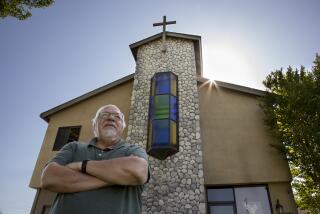Before Picking a Pastor, Do the Homework
- Share via
In previous decades, congregations were often reluctant to oust pastors when tensions ran high. Amid a recent atmosphere of growing distrust of clergy, however, that has changed. Congregations are more willing to ask pastors to leave if conflicts arise.
But pastors and their congregations can head off trouble. In fact, when it comes to mismatches between ministers and the churches they serve, leaders who are experienced in the selection process suggest that precaution is the best remedy.
United Methodist Church Bishop Albert F. Mutti of Kansas said he believes in a lot of homework as a first step.
“We try to match the needs of the congregation with the pastor’s qualifications,” said Mutti, a church leader who has long been involved in appointing pastors to congregations. “We also use spiritual discernment, with time for prayer and listening.”
But even with lengthy appointment processes and annual reviews, Mutti concedes that mismatches occur, with about 1% of the 500 charges under his jurisdiction “escalating into a conflict.”
Supervision of pastors and good communication with congregations are essential elements in preventing such crises, Mutti said. “We get in trouble when communication breaks down and we can’t get the conflict resolved then,” he said.
Lyle Schaller, a parish consultant on staff at the Yokefellow Institute in Richmond, Ind., said unanimity among members of pastoral selection committees is a goal worth striving for. Good matches are more likely when a block of supporters “has a stake in the pastor’s success,” he said.
As a way of heading off trouble, he suggests that new ministers fulfill two or three “visible, fairly trivial” needs of a congregation first, setting an early record of success and concern. After that, the new pastor can present new ideas, having gained the members’ trust.
Some of the worst situations arise when a congregation “doesn’t do its homework,” Schaller said. Such a case would be when a bishop offers three candidates to a congregation, and the first is rejected as an obvious mismatch, the second turns down the invitation, so the third is accepted as pastor by default.
The congregations that avoid conflict the best are those organized by a pastor and nurtured by that same person to maturity, or congregations that have full responsibility for picking the pastor that will lead them.
More to Read
Sign up for Essential California
The most important California stories and recommendations in your inbox every morning.
You may occasionally receive promotional content from the Los Angeles Times.













